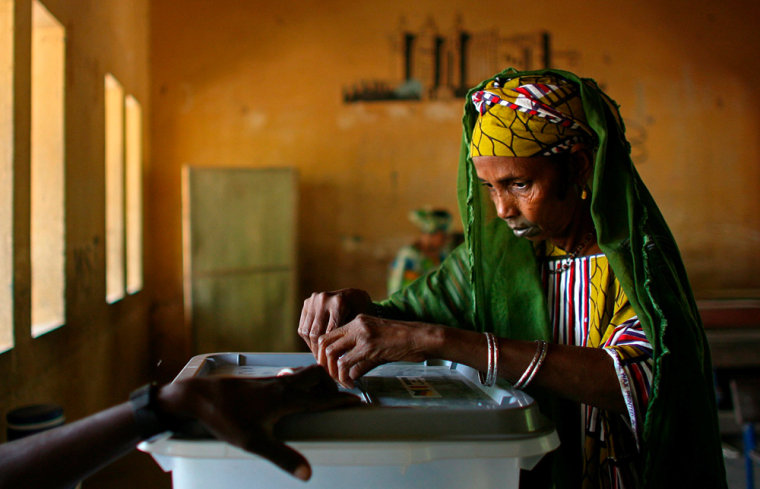Malians dipped their fingers in blue ink and marked ballots with pictures of the candidates running for president Sunday — the country’s fourth democratic vote in a region where vote-rigging and election-related violence is rife.
President Amadou Toumani Toure was widely expected to win a second five-year term against seven opponents, despite complaints by some that he has not done enough for the 60 percent of the population that lives below the poverty line.
“I’m here to vote so that another Mali may be possible,” said 18-year-old Alima Sanogo, a university student who was waiting to cast her ballot for Tiebil Drame, a schoolteacher and former Cabinet member running against Toure.
Voters in the impoverished African nation of 12 million lined up early Sunday at more than 20,000 polling stations to cast their ballots. The voting system requires people to use ink to choose their candidates because of the high illiteracy rate.
Democracy, but a bit of apathy, too
Mali slid into dictatorship after gaining independence from France in 1960, but a 1991 coup led to elections the following year. Mali’s then-president stepped down after the maximum two-term limit and Toure was elected in a peaceful 2002 vote.
A candidate needs to win at least 51 percent of the vote to avoid a runoff. Election results were not expected for days.
Malians take pride in their reputation as an African country that has managed to embrace democracy despite poverty and ethnic divisions, but voter turnout appeared to be low in the capital of Bamako on Sunday. Some voters complained of widespread apathy.
“Our people are just not coming out,” said Idrissa Dembele, a delegate of the National Independent Commission monitoring the election.
He said in some Bamako neighborhoods, only a fraction of registered voters had bothered to pick up their voter cards by election day. In the interior, however, as many as 90 percent of voter cards had been retrieved in some localities and turnout was significantly higher.
Mali’s election follows a week after a presidential vote in Nigeria that was deemed flawed by local and international observers because of rampant ballot box stuffing, vote-rigging, lack of ballots in polling stations and voter intimidation.
